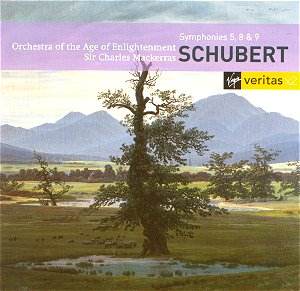Franz SCHUBERT (1797 - 1828)
CD1
Symphony No 5 in B Flat Major [28.45]
Symphony No 8 in B Minor [38.20] Completed by Brian Newbould (Including Entracte
Music No I from Rosamunde)
Rosamunde. Incidental Music.
Ballet Music No 2 [6.54]
CD2
Symphony No 9 in C Major "The Great" [59.35]
 Orchestra of the Age of
Enlightenment
Orchestra of the Age of
Enlightenment
Sir Charles Mackerras
Recorded Abbey Road Studios.
CD1 November 1990, CD2 October 1987. DDD Total Timing [133.46]
 Virgin veritas 2CD VBD5
61806 2
£8.99
Virgin veritas 2CD VBD5
61806 2
£8.99
Crotchet

The main point of interest in this double disc of
re-releases is the 'completion' of Schubert's 8th Symphony by Brian
Newbould. Professor Newbould has taken Schubert's sketches for the
third movement Scherzo which were left in piano score along
with two pages already completed in full score. The Trio had
just one melody in the first section so some conjecture and speculation
have been called for to go further. To this fleshing out he has added
the B Minor entr'acte from Rosamunde as the fourth and
final movement. - an ending to the symphony that has long had advocates.
The Newbould conclusion has been recorded previously ( Marriner /
ASM / Philips) and this recording helps to confirm it as a plausible
option in one of music's great "what if''s".
Charles Mackerras is a conductor who has never been reluctant to use the
best of what period performance can offer yet without turning his back on
the traditional, and here with an Orchestra dedicated to the period style
and specialist instruments he is completely at home. There are some period
specialists who seem to revel in extremes of tempi and their players can
sometimes be heard to struggle to match the baton. Here Mackerras sets a
relaxed choice of tempi throughout and the OAE seem to revel in the choices
he makes.
There are two Schuberts to be heard in the Symphonies on the first CD. In
the B Flat Major (No 5) we hear the sunny, genial composer, doffing
his cap to Mozart, in a reading full of delights - Schubert the Charmer.
The Unfinished shows considerable depth of emotion and passages that
point to the composer's hidden turmoil. The distinctive sounds that the older
instruments make are a gain, less bland and homogenised than their modern
counterparts and they benefit from a good, clear recording. The filler -
Rosamunde Ballet Music 2 is a delight.
The "Great" C Major on CD2 - a work that has many, many opinions expressed
about it from the sleeve-note writer's dream quote - "Heavenly Length" (Schumann)
to G.B.S's put-down " A more exasperatingly brainless composition was never
put on paper". It is a work frequently recorded, often with great success
(a personal favourite is the Boult / LPO version on EMI - old fashioned,
perhaps, but so convincing). All the repeats (which prompted Shaw's remark)
are included and the tempi controlled but lacking the final degree of spring
in the step at times. Even more than earlier, the period sounds are a distinct
plus point - especially the brass which make a splendid impact against strings
that have less weight than today's instruments.
Recommended listening - you do not need to be a period performance devotee
to enjoy it.
Reviewer.
Harry Downey

